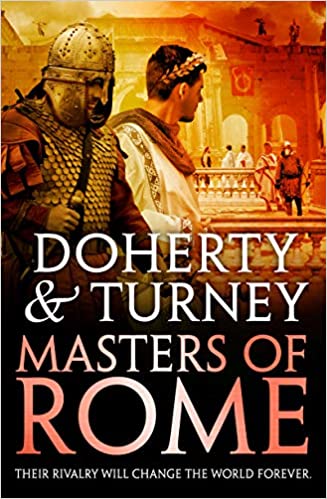Rating: 10/10
Synopsis:
Their rivalry will change the world forever.
As competition for the imperial throne intensifies, Constantine and Maxentius realise their childhood friendship cannot last. Each man struggles to control their respective quadrant of empire, battered by currents of politics, religion and personal tragedy, threatened by barbarian forces and enemies within.
With their positions becoming at once stronger and more troubled, the strained threads of their friendship begin to unravel. Unfortunate words and misunderstandings finally sever their ties, leaving them as bitter opponents in the greatest game of all, with the throne of Rome the prize.
It is a matter that can only be settled by outright war…
Review:
Thank you to Aries Fiction, Jade Gwilliam at Head of Zeus, Netgalley, for providing me an ARC via Netgalley. All thoughts and opinions are my own.
This is a monumental triumph detailing the stories of men who brought the downfall of Rome, and those that died trying to save it. The book’s motto says what it does on the tin. The conflict between Emperor Maxentius and Emperor Constantine decided the fate of Western Europe for the next thousand years. The Rise of Christianity which gave shape to the Medieval Era to this very day. This was an intense ramification that we are talking about here, and not much is explored about how early Roman Christianity looked as opposed to its Medieval times. This book perfectly illustrates how Rome’s magnificence fell into ruinous decline. I hardly claim to be an expert on the Crisis of the Third Century, which saw the death of Emperor Septimius Severus result in the Empire’s succession thrive into chaos. Without a proper line of an Imperial family, successive generals took charge, and thus civil war, inflation, taxation, and constant warring from Germanic tribes and the Sassanid Empire weakened Rome’s borders. The Empire itself was a facade. Sure, you had the Empire. But you also had the Senate and the People of Rome. This stretches back to the day of Augustus. What you will see in this book is the complete unraveling of Roman Politics and the herculean task of rebuilding an empire. Diocletian’s reforms brought down the Empire more than it was intended to revive it.
The politics of this period is rife with conspiracy, betrayal and love, loss, and disaster. The religious turmoil of the growing new religion of Christianity in the heart of Rome and Africa, to Gaul and the East of the Roman Provinces, is clearly illustrated. Tensions boil between Roman Paganism and Roman Christianity. Emperor Maxentius has a difficult problem of dealing with the new cult, as it would have looked to him at the time and how Roman Christians themselves weren’t united on a single purpose, having constant and conflicting ideas. Maxentius should be credited as a greater man for Christianity because he indirectly helped and built the foundations of a strong Christian state to take over when Constantine historically assumes the role of Imperator. That’s as much clue you’ll get. In this novel, you’ll explore so many areas of the cities of Rome, Augusta Treverorum, a Roman City in Germania that resembled the capital. You’ll be seeing so much new history it’s like a virtual history tour of a video game for a second. You’ll see Praetorians killing and butchering Romans within the City of Rome. You’ll see generals and emperors at each other’s throats. Confrontations, insults, all the lot you can expect that is associated with Roman Politics. Let it be clear, this is your classic Roman novel. Loyal men fighting to preserve an already collapsing empire. Constantine couldn’t prevent the Empire from falling even when he had a solidified grasp on Rome’s influence. And another thing: When the legions of Rome aren’t paid, they will revolt. That has been a consistent theme within Roman military history for that matter. There are so many emotional scenes written in this book describing the private/personal lives of the two characters, you will tear up.
Old characters make a return and they fit well. Galerius, the man who had set out to become the master of the world becomes a shadow of his former shelf. Maximian, father to Maxentius by his daughter’s marriage, Valeria. These two men who had once participated with Diocletian in the events of the first novel to bring back peace to Rome are shown to have utterly failed. The novel doesn’t need to make that up for you, if you read on the politics of this time, it seems every Emperor and every General was declaring himself Emperor and trying to reclaim Rome all the time. Valeria is one character I never liked, and I still don’t like her. It was a mistake, both in the novel and in real life, for Maxentius to even get married to her. A political marriage is never a trust-worthy alliance of two souls, and in the rare cases that it is, it is a miracle. There is a vibrant and colorful cast of characters, and I also discovered how the Franks, part of the Germanic tribes that were launching wars on Rome all the time, became integrated into Constantine’s army as he defended the Empire from their raids. So by the time, the Empire did officially convert to Christianity, and the Empire split into two, the Western Roman Empire and the Eastern Roman Empire. You already get to see how the Franks soon converted to Christianity and that then formed the Frankish Kingdom, i.e the medieval foundation of France as we know it. But I’ve diverged a bit and gone a bit too ahead for myself. So that’s a fun and cool fact. For all I know I could be wrong.
There’s nail-biting action in this novel, and there’s no shortage of excellent battle scenes. One thing that I did not get was that were the Roman troops still using lorica segmenta and using the equipment of Gallic-style shields, or did they revert to the oval ones that became more popular around the time of this crisis? I did not, and might never like Constantine. I think Maxentius, for all his faults, would have made a better Emperor for Rome. Maxentius was no naive fool. But inside, I felt sadness that with the passing of Emperor Galerius (this being the man who was declining, was the only thing standing between Constantine and Maxentius from declaring war on each other) that these two great men, will soon become enemies. The childhood friendship is over. Now Rome’s destiny will be forged at the battle of the Milvain Bridge, and the fate of Western Civilization is about to be born, anew. I say, without a shadow of a doubt, that Simon Turney and Gordon Doherty, two of my favorite authors, have delivered an outstanding sequel. I feel sad that Maxentius did not become Emperor of Rome however.
10/10 from me.





Leave a Reply